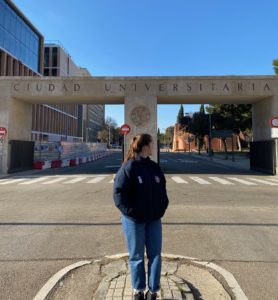For those of you who have not read my blog, I am Hannah, a third-year Modern Languages student currently on my Year Abroad. I have just finished my semester at Universidad de Zaragoza in Spain and am due to begin my internship in Normandy, France next month. In this post I am going to try and share my experience and advice on what to do when you encounter ‘Imposter Syndrome’ on placement. Imposter syndrome is a psychological occurrence in which someone doubts their skills and has a persistent internalised fear of feeling like they don’t belong somewhere. This feeling seems to be more common among people who are embarking on a new challenge, such as a new job or moving to a new country. Therefore, the Year Abroad is a very likely time where this can manifest as you are both moving abroad and beginning a new placement/challenge at the same time!
I can honestly say that I have struggled with this feeling on and off throughout my life, particularly within academic settings and the main symptom being perfectionism, but moving abroad I definitely felt much more aware of it. For the first few weeks in Spain it manifested itself in a few different ways: language insecurities, lack of deep cultural understanding, accepting accomplishments, lack of knowledge of bureaucracy and foreign procedures, a reduced support network (increased independence), etc.
Adapting to a new culture, getting to know unfamiliar faces, attending a different university; it's all at once overwhelming and totally thrilling. Essentially, it's a period of getting to know the people and places around you - with most sentences starting with "Hola, soy...", and which can make you miss home and your friends back at Bath. The fear of not being understood is often a lot worse in your head; anxiety reduces your brain’s ability to process the language properly. The fear of being judged for grammar or pronunciation mistakes usually comes into play as well.
Since I was an Erasmus student, I often felt out of place and had the personal feeling that I was not good enough or smart enough to be there and be a part of the academic community at the same level as others; I was taking modules in subjects I had never explored in much depth before - I had never taken a philosophy class in my life and suddenly I was thrown into a third year class of 62 students in Philosophical Anthropology… there is no doubt why I began questioning my belonging here.
After some time settling in, this semester actually became one of the best periods of my life. I came out of the semester not just with good marks, but with a new found self-confidence and maturity. It is useful to remember that the Year Abroad experience is supposed to push you out of your comfort zone, to do something exhilarating, and to grow as a person. By the end of the semester I felt just like a local and am incredibly proud of how I adjusted to this new life.
Becoming aware of imposter syndrome has helped my mental resilience in the face of setbacks. I learnt how to reframe my thoughts and distinguish between self-doubt and something real to work on - it’s all about putting you back in control of your feelings! I wouldn’t have had my semester abroad any other way - I have grown immensely as a student and as a person.
Respond

